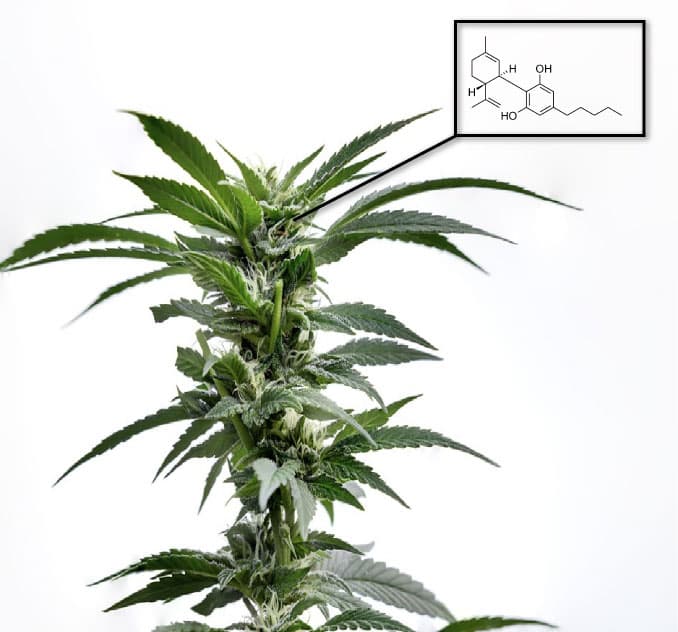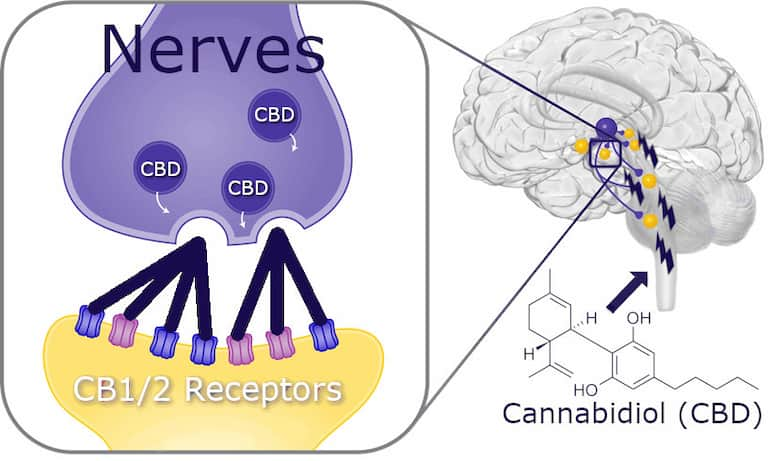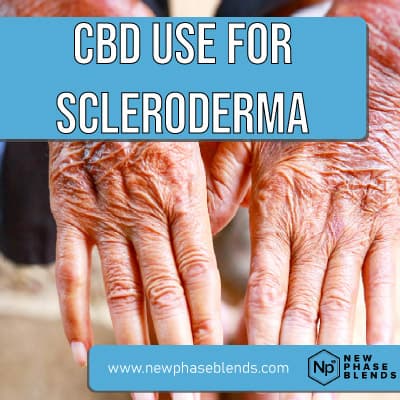Scleroderma is a rare and severe illness that affects about 75,000 to 100,000 people in the United States. It’s also known as systemic sclerosis. It can be a devastating illness that results in significant bodily damage, disability, and shortened life expectancy. This will be a review of using CBD for scleroderma as a way to cope with the discomforts.
Although there is no cure for scleroderma, it may be controlled through the use of medicines. Scleroderma can be alleviated with medication in many cases; however, this is not always the case. One promising new treatment is CBD for scleroderma.
While more research is needed, CBD oil may offer new hope for those living with scleroderma.
What Is Scleroderma?
Scleroderma is an uncommon rare autoimmune disease in which the body produces too much collagen. This excess collagen leads to the hardening and thickening of the skin and organ damage.
Scleroderma can either be systemic or localized. Systemic scleroderma affects the entire body, while localized scleroderma only affects one body area. The symptoms and severity of the condition vary from person to person, and scientists aren’t exactly sure what causes the disease.

Treatment plans are multidisciplinary, tackling symptoms that involve many bodily organs because this can be a challenging disease, and it might be tough to live with as an individual. But with some support and awareness, you can become more comfortable in your skin and relieve common symptoms like pain, fatigue, and malnutrition.
What is CBD?
Cannabidiol (CBD) oil is produced from the cannabis plant, and it has been shown to have anti-inflammatory and immunomodulatory effects. Additionally, CBD oil effectively reduces anxiety and pain in various conditions.

CBD is called a cannabinoid, which just means plant chemical. Cannabis is filled with cannabinoids – over 120 to be exact. We are learning more and more about these natural chemicals every single day.
Symptoms and Signs of Scleroderma
Scleroderma can manifest itself in various ways, ranging from minor to severe and even life-threatening. The severity of symptoms is determined by which body areas are affected and how widespread the disease has spread.
Sclerosis is a disease that attacks the skin and causes an abnormal skin condition that becomes thick and hard. It’s linked with tissue hyperplasia, which can harm your inner organs.
Scleroderma comes in two varieties. Each type influences the symptoms and affected regions differently. The following are descriptions of the two sorts, as well as their signs:
Localized Scleroderma
Localized scleroderma is usually minor. Although it primarily affects the skin, it can also spread to the joints, muscles, and bones. It rarely becomes a systemic illness, although it occasionally affects the internal organs. There are two distinct types of localized scleroderma:
Morphea:

Morphea typically appears as patches of thickened skin that are firm and waxy. Patches on the skin may be darker or lighter than the surrounding skin, and they often have a crinkled or dimpled surface.
Linear scleroderma:

Linear scleroderma involves the development of a thick rope-like band of tissue beneath the skin. This band can stretch from the top of the head to the bottom of the foot, and it may affect the muscles, joints, and bones below the skin.
Related: Taking CBD for Muscle Pain
While localized scleroderma doesn’t typically affect the internal organs, diffuse sclerosis can cause diffuse systemic sclerosis fibroblasts to produce excess collagen in any organ in the body.
As a result, scleroderma patients may experience organ damage, including heart, lung, and kidney problems. Diffuse sclerosis is considered a more severe form of scleroderma because it can be life-threatening.
Systemic Scleroderma
Systemic scleroderma is a chronic, progressive rare auto-immune disease that affects the connective tissue in many parts of the body, joints, muscles bones, blood vessels, heart, gastrointestinal tract, esophagus, lungs, kidneys, and the skin.
Systemic scleroderma may cause the development of excessive collagen and scar tissue in the lungs (interstitial lung disease), resulting in narrowing and blockage of the pulmonary arteries (pulmonary artery hypertension). There are two types of systemic scleroderma:
Limited Scleroderma

Limited scleroderma typically affects the skin and muscles of the hands and face and can cause Raynaud’s phenomenon, which is when the blood vessels in the fingers and toes constrict in response to cold or stress.
The precise source of limited sclerosis is unknown, but it is most likely the result of an autoimmune response that leads to excessive collagen production. In addition, exposure to specific chemicals has been linked to the condition in some circumstances.
Diffuse Scleroderma
Diffuse scleroderma involves internal organs such as the gastrointestinal tract, heart, and lungs. Scleroderma patients often experience fatigue, joint pain and stiffness, Raynaud’s phenomenon, and difficulty swallowing. Unfortunately, there is no cure for systemic scleroderma, but treatments are available to help manage symptoms and slow the progression of the disease.
Using CBD for Scleroderma
Scleroderma is a condition that affects the connective tissue and inner organs, accompanied by the hardening and thickening of the skin. It can be challenging to diagnose because it shares symptoms with other conditions, but recent studies have shown that CBD can effectively treat scleroderma patients because CBD aids in dealing with the discomforts.

CBD oil is known to help with chronic pain, inflammation, anxiety, and insomnia, all of which are common symptoms of scleroderma. In addition, CBD oil can help to improve the quality of life for scleroderma patients by reducing the severity of these symptoms.
Anti Inflammatory Effects of CBD
CBD does appear to have potential anti-inflammatory effects. This is fantastic news for anyone who has scleroderma or other painful conditions, as inflammation is a leading cause of pain. Scleroderma is a condition where the fingers enlarged blood vessels harden. Unfortunately, there is no cure for scleroderma, but CBD may be able to help treat the symptoms.

A study found that CBD could reduce inflammation in rats with scleroderma. The study’s authors believe that CBD works by inhibiting the fatty acid amide hydrolase, an enzyme that plays a role in inflammation. CBD is showing promise as a treatment for scleroderma and other inflammatory illnesses, according to preliminary studies.
Is CBD Safe?
CBD is a safe and natural medication with few side effects, making it an ideal treatment option for systemic sclerosis patients.
How Can CBD Help with Scleroderma? What are the Benefits?
CBD has an anti-fibrotic effect in scleroderma cases. It also helps to decrease other symptoms such as inflammation, insomnia, pain, and in case of respiratory and gastrointestinal problems. In addition, the many healing properties of CBD can help prevent complications that may arise from scleroderma while it promotes healthy skin renewal.
Despite the fact that few human studies have looked at the influence of CBD on scleroderma, the research has been promising. For example, a 2006 animal study showed that topical application of CBD decreased skin thickness and improved skin function in rats with scleroderma. A similar study in 2016 looked at the effects of CBD on intestinal fibrosis and found that CBD was able to decrease inflammation and oxidative stress.

CBD may also affect internal organs accompanied by systemic sclerosis by reducing oxidative damage. For example, in a 2017 study on mice, scientists found that CBD helped reduce inflammation and fibrosis in the lungs of mice with scleroderma. CBD has also been shown to reduce pain and insomnia, two common symptoms experienced by patients with scleroderma.
Despite the fact that there are still a lot of studies to be done in order to determine CBD’s effectiveness in treating scleroderma, the existing evidence suggests that it may be a helpful addition to existing treatments.
CBD Role in Autoimmune Diseases
According to a 2016 study that examined CBD’s role in autoimmune diseases, CBD has immunosuppressive effects. CBD is highly effective in limiting leukocyte movement and triggering cell death (apoptosis) while also reducing the production of cytosines, which cause inflammation.
The systemic scleroderma patients saw a decrease in CBD levels and an increase in positive results, including improvements in their quality of life, lessened pain, and reduced inflammation.
The study also found that CBD helps to reduce other symptoms such as fatigue, muscle pain, and morning stiffness. In addition, CBD has an anti-fibrotic effect in scleroderma cases, which helps reduce the build-up of collagen that can lead to fibrosis.
Finally, the scientists concluded that CBD effectively treats a variety of autoimmune conditions and offers a safe and natural alternative to traditional medications.
Scleroderma and the Endocannabinoid System
The endocannabinoid system is a potential target for scleroderma drugs for several reasons. For another thing, scleroderma fibroblasts overexpress both cannabinoid receptor subtypes. In addition, the amount of FAAH (the metabolic enzyme which degrades the endocannabinoid anandamide) is significantly reduced in the skin of scleroderma patients.
This implies that the endocannabinoid system is out of balance. Nevertheless, the endocannabinoid system has played a role in rheumatic diseases, and targeting it with drugs could alleviate inflammatory pain.
Furthermore, because the endocannabinoid system is located in the central nervous system, using medicines to target it might help relieve a variety of scleroderma-related symptoms, such as tiredness and sadness. Consequently, the endocannabinoid system represents a promising target for future scleroderma treatments.
THC and Fibrosis Affects
Cannabinoid receptors are throughout the body, with two main subtypes – CB1 and CB2. Cannabinoids, like CBD and THC, play an essential role in maintaining a balance between pro-and anti-fibrotic properties, which are vital in keeping the body healthy.

Cannabinoid receptors are found throughout the body and in the skin. Skin diseases typically involve an overproduction of collagen, the main protein in the skin. The body produces excess collagen to heal the skin, but this often results in a build-up of scar tissue. Cannabinoid receptors subtypes are thought to play a role in regulating collagen production.
This balance is disrupted in conditions such as fatty liver disease and certain skin diseases, and excess connective tissue begins to grow. The excess tissue can lead to severe problems, a decline in quality of life, and patients suffering.
CBD can have antifibrogenic or profibrogenic effects in the liver, which both are cannabinoid receptor subtypes. In addition, CBD has been shown to induce such results as well.
The good news is that targeting these receptors may be possible to restore the balance and improve symptoms. More research is needed to confirm this, but the potential benefits are promising.
Summary – CBD for Scleroderma
Scleroderma is a rare disorder that can be difficult to diagnose and treat, particularly because it appears to have no definitive cause. Although CBD has not been thoroughly researched in scleroderma, several doctors and specialists urge its use to alleviate symptoms and reduce pain and inflammation.
CBD may work by reducing peripheral nervous system pain, keeping connective tissue healthy, and reducing inflammation in the body. In addition, medical cannabis is an effective treatment for other chronic conditions like chronic pain, multiple sclerosis, and more.
If you have this disease and are searching for an alternative treatment, CBD is a good option and there is a wide range of hemp-derived CBD products to deal with specific needs throughout the body. Try out a few different products to see which yields the best results for you and your condition.












